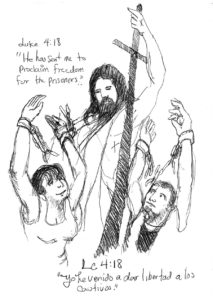It seems that sometimes we Catholics neglect to mention that the Lord Jesus explicitly told us why he was sent by the Spirit of the Lord, as he quoted the Old Testament prophecy.
Recent experiences reminded us.
We received a call from a hospital asking if we could accept an 18-year old mother of tiny twin babies who had nowhere to go. She had not been too long in the United States. We rejoiced that we had space for her. When the baby girls arrived, the women of the house rose up in solidarity to help with them.
We had just recently received a woman whose brother was killed by gangs in Ecuador. Three men who had lost a leg or had one crushed also came to ask for help. A man who is blind from an assault on the street came again for help (We have helped him travel to Harvard for experimental treatment for his eyes).
These experiences brought to mind the Lord’s own explanation of his Incarnation on our earth. The Lord’s words are recorded in chapter 4 of St. Luke’s Gospel:
The Spirit of the Lord is upon me,
because he has anointed me
to bring glad tidings to the poor.
He has sent me to proclaim liberty to captives
and recovery of sight to the blind,
to let the oppressed go free,
and to proclaim a year acceptable to the Lord.
He said to them,
“Today this Scripture passage (from the book of Isaiah) s fulfilled in your hearing.”
Mary’s song, the Magnificat, known and loved by so many generations, affirms this mission that the Lord spelled out for us:
My soul magnifies the Lord
And my spirit rejoices in God my Savior;
Because He has regarded the lowliness of His handmaid;
For behold, henceforth all generations shall call me blessed;
Because He who is mighty has done great things for me,
and holy is His name;
And His mercy is from generation to generation
on those who fear Him.
He has shown might with His arm,
He has scattered the proud in the conceit of their heart.
He has put down the mighty from their thrones,
and has exalted the lowly.
He has filled the hungry with good things,
and the rich He has sent away empty.
He has given help to Israel, his servant, mindful of His mercy
Even as he spoke to our fathers, to Abraham and to his posterity forever.
The refugees and the poor who come to us are often considered the lowly. The Incarnation, Christ’s presence in our world, is the heart of the mystery of Christianity. We are grateful to be able to participate in his mission of bringing glad tidings and practical help to the poor and those who have suffered.
We do not always talk a lot about the Bible to people who come to us, but we are present here. We usually do not know whether those who come to our door for help are believers or not. We not preach at our door. Our way of sharing the Gospel has been with the priests who have rotated in to celebrate Mass on Wednesday evenings for those who are staying at our houses of hospitality.
Dorothy Day did not emphasize proselytizing to the poor. We also do not distinguish among those who come to us for help who are believers or non-believers, worthy or unworthy, although we frequently discover that the poor and those who have suffered very much do put their hope in God. We try to listen to what people ask of us, even though often we cannot solve their problems.
We sometimes identify with the comment of Georges Bernanos’: “Pious persons doubtless have a lot of things to say to unbelievers, but often they could also have a lot of things to learn from these unhappy brothers, and they risk never knowing what those things were because they never stop talking.” (Hans Urs von Balthasar, Bernanos, An Ecclesial Existence).
Christ is the Concrete Norm of Christian Ethics
Hans Urs von Balthasar, like many recent Popes, emphasizes the idea of mission, following Jesus in our lives, given for the world: “Balthasar ‘s idea of ethics, while acknowledging the value of natural law, underscores that Christ is the concrete norm of Christian ethics, which dramatically transformed the meaning of Christian self-understandings of moral existence in terms of mission and discipleship” (Carolyn A. Chau, Solidarity with the World, p. 129).
We know from the Lord’s own words and example that Christian mission and discipleship emphasize the poor and those who suffer, not just the successful. The Incarnation is for all.
As Tony Magliano recently wrote: “For almighty God revealed in the clearest ways the inestimable worth of humanity by humbly becoming one of us, walking with us, teaching us, suffering for us, dying for us, and rising from the dead for us!”
Houston Catholic Worker, October-December 2024, Vol. XLIV, No. 4.


